
Gladius
Scope & Guideline
Fostering Intellectual Growth in the Realm of History
Introduction
Aims and Scopes
- Archaeological Studies of Military Artifacts:
The journal extensively publishes research on the excavation and analysis of military equipment, such as weapons and armor, from different historical contexts, providing insights into their construction, use, and cultural significance. - Historical Analysis of Warfare:
Papers often explore the strategic, social, and political implications of warfare, examining how military actions have shaped historical events and societies. - Interdisciplinary Methodologies:
The journal encourages the use of diverse methodologies, integrating archaeological evidence, literary sources, and epigraphic data to provide a comprehensive understanding of military history. - Regional Studies:
There is a consistent focus on specific regions, particularly the Iberian Peninsula and its historical contexts, including Roman, medieval, and early modern military history. - Cultural and Social Aspects of Military Life:
Research often delves into the social dynamics of military life, including the experiences of soldiers, the role of women, and the intersection of military and civilian life.
Trending and Emerging
- Focus on Specific Military Campaigns:
There is an increasing number of studies centered on particular military campaigns, such as the Conquest of Mexico and the Bourbon triumph in Spain, indicating a trend towards detailed historical narratives that contextualize warfare within specific events. - Integration of Epigraphy and Philology:
Recent papers have increasingly incorporated epigraphic and philological methods to analyze military inscriptions and documents, suggesting a trend towards a more nuanced understanding of historical texts in relation to military history. - Archaeological Contextualization of Military Sites:
Emerging research emphasizes the archaeological context of military sites, such as fortifications and camps, providing insights into their construction, use, and significance in broader historical narratives. - Analysis of Military Equipment Evolution:
There is a growing trend in examining the technological advancements and changes in military equipment over time, reflecting interests in how innovations influenced warfare strategies and outcomes. - Cultural Interactions and Military Diplomacy:
Recent publications highlight the role of military diplomacy and the cultural exchanges that occurred through military interactions, indicating a shift towards understanding the broader implications of warfare beyond mere conflict.
Declining or Waning
- Studies on Non-Military Artifacts:
There has been a noticeable decrease in papers focusing on non-military artifacts from the same historical periods, indicating a waning interest in broader archaeological contexts outside of military studies. - Theoretical Approaches to Warfare:
Less emphasis appears to be placed on theoretical frameworks analyzing warfare from perspectives such as gender, class, or post-colonial studies, suggesting a potential narrowing of focus to more empirical studies. - Comparative Studies of Global Warfare:
Papers comparing military practices across different cultures and regions have become less common, indicating a trend towards more localized studies rather than broader comparative analyses.
Similar Journals

Vulcan
Advancing Scholarship in the Arts and Humanities.Vulcan, a distinguished journal in the field of History, is published by BRILL, a renowned academic publisher based in the Netherlands. With its ISSN 2213-459X and E-ISSN 2213-4603, it stands as a repository for innovative historical research and interdisciplinary dialogue, reflecting a commitment to advancing scholarship in the arts and humanities. With an impressive Scopus ranking of #175 out of 1760 in the Arts and Humanities - History category, placing it in the 90th percentile, Vulcan demonstrates its valuable contribution to the academic community. Although it is categorized in the Q4 quartile for 2023, the journal's unique focus and scholarly rigor position it as a credible source for both emerging and established historians. The journal aims to publish original research articles, reviews, and commentaries that address pivotal themes and debates within historical studies. By fostering the dissemination of knowledge and encouraging dialogue among researchers, professionals, and students alike, Vulcan is poised to enhance the understanding of our past while shaping the discourse for future scholarship.
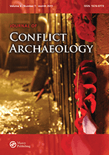
Journal of Conflict Archaeology
To Illuminate the Shadows: Discovering Archaeology in ConflictJournal of Conflict Archaeology, published by Routledge Journals, Taylor & Francis Ltd, is a pivotal periodical in the field of archaeology and history, focusing on the intersections between human conflict and archaeological practice. With a robust ISSN of 1574-0773 and E-ISSN 1574-0781, this journal not only presents innovative research findings but also catalyzes critical discussions on how conflicts shape and are shaped by material culture. Spanning volumes since 2005 and continuing through 2024, the journal is ranked in category quartiles, achieving Q3 status in Archeology and Arts & Humanities, and Q2 in History by 2023 metrics, illustrating its significant contribution to academic discourse. The Journal of Conflict Archaeology emphasizes accessibility for scholars and practitioners, making valuable insights available to those navigating the complexities of archaeology in context to historical conflicts. With research that is cited within the 78th and 67th percentiles of its respective fields, this journal serves as an essential resource for researchers, professionals, and students aiming to deepen their understanding of archaeological methodologies in conflict studies.

Naval War College Review
Charting New Courses in Naval Research and TheoryNaval War College Review is a prestigious academic journal published by the US Naval War College, dedicated to advancing scholarship in naval and maritime strategy, military operations, and international relations. This journal serves as a vital platform for the dissemination of cutting-edge research, insightful analysis, and theoretical discourse that addresses contemporary and historical issues affecting global security and naval warfare. With an ISSN of 0028-1484, the review offers an important repository of knowledge for researchers, professionals, and students alike, encompassing interdisciplinary studies related to naval strategy, policy formulation, and military history. The Naval War College Review is committed to fostering a deeper understanding of the maritime domain, empowering its readers to navigate the complexities of naval warfare through rigorous scholarship. Although it is not an open-access journal, its critical contributions continue to shape the future of naval studies and defense considerations across the globe.
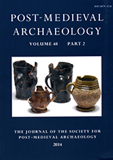
Post-Medieval Archaeology
Illuminating the Layers of Human HistoryPost-Medieval Archaeology is a distinguished academic journal published by ROUTLEDGE JOURNALS, TAYLOR & FRANCIS LTD, focusing on the rich tapestry of human history from the post-medieval period through the lens of archaeology. With a proud publication history spanning since 1967, this journal addresses the integration of archaeological findings with historical narratives, contributing significantly to the field of archaeology and history. The journal holds an impressive categorization within the Q2 and Q3 quartiles for Archaeology and History in 2023, showcasing its commitment to academic excellence and relevance within these disciplines. Researchers and professionals alike will find value in its critical examinations and innovative methodologies that illuminate the past, making it a pivotal resource for those engaged in archaeological research. As an essential platform for scholarly debate and dissemination, Post-Medieval Archaeology continues to advance the understanding of post-medieval contexts and material culture, fostering discussions that resonate through various areas of the arts, humanities, and social sciences.
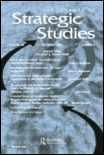
JOURNAL OF STRATEGIC STUDIES
Navigating the Complexities of International RelationsJOURNAL OF STRATEGIC STUDIES is a premier academic journal dedicated to the fields of political science and international relations, published by Routledge Journals, Taylor & Francis Ltd. Established in 1978, this journal has built a strong reputation for disseminating high-quality research and theoretical contributions that drive innovation and scholarship in strategic studies. With a commendable impact factor that places it in the Q1 quartile for Political Science and International Relations, and Q2 quartile for Sociology and Political Science, the journal ranks among the top publications with notable Scopus rankings that reflect its influence and reach. The journal’s comprehensive scope encompasses a wide array of topics, from security studies to diplomacy, making it an invaluable resource for researchers, professionals, and students alike. Although it operates on a subscription-based access model, the journal's commitment to advancing knowledge in strategic studies ensures that it remains a vital platform for scholarly dialogue and exploration. Join the community of scholars contributing to cutting-edge research through this leading journal.
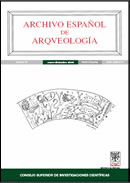
Archivo Espanol de Arqueologia
Discovering the past, shaping the future of archaeology.Archivo Español de Arqueología is a prestigious journal published by the Consejo Superior de Investigaciones Científicas (CSIC), dedicated to the field of archaeology and the historical sciences. Since its transition to Open Access in 1991, this journal has been a significant resource for scholars and practitioners in Spain and beyond, ensuring the dissemination of high-quality research to a broad audience. With an impressive Scopus ranking that places it within the top 20% of journals in the disciplines of History and Archaeology, Archivo Español de Arqueología plays a crucial role in advancing academic discourse and promoting innovative archaeological methodologies. The journal has maintained rigorous standards, reflected in its placement within the Q2 and Q3 quartiles, enabling it to establish a reputation for excellence and reliability in archaeological scholarship. Researchers, professionals, and students are encouraged to explore the journal's diverse array of articles from its foundation year of 2009 to the present, enriching their understanding of the past through the latest findings and theoretical advancements in archaeology.

Cuadernos de Historia Moderna
Unlocking the Secrets of Our Recent PastCuadernos de Historia Moderna is a prominent academic journal dedicated to the field of modern history, published by UNIV COMPLUTENSE MADRID, SERVICIO PUBLICACIONES. With its commitment to Open Access since 1988, this journal ensures that cutting-edge research is freely accessible, fostering scholarly engagement and collaboration among researchers, professionals, and students alike. Operating from Madrid, Spain, Cuadernos de Historia Moderna is characterized by its interdisciplinary approach, attracting contributions that explore various aspects of modern history, from cultural shifts to socio-political developments. Although positioned in the Q4 quartile within the Arts and Humanities History category (ranked #1329/1760), it remains an important platform for emerging scholars and established professionals looking to disseminate their research on contemporary historical issues. With continued growth in its reach and visibility, this journal is poised to play a crucial role in shaping historical discourse for years to come.
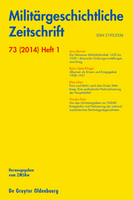
Militargeschichtliche Zeitschrift
Exploring the tapestry of military history.Militargeschichtliche Zeitschrift, published by WALTER DE GRUYTER GMBH, stands as a pivotal journal dedicated to the critical study of military history, exploring the intricate dynamics of warfare, its societal impacts, and the evolving narratives that shape our understanding of conflict. With an ISSN of 2193-2336 and an E-ISSN of 2196-6850, this journal serves as a prominent platform for researchers, professionals, and students interested in the multifaceted interpretations and consequences of military events across various epochs. Though it operates on a traditional access model, the journal's commitment to rigorous scholarship and comprehensive reviews ensures its articles are essential for those looking to deepen their insight into the historical implications of military actions. The contributions published herein not only enrich the field of military studies but also foster interdisciplinary dialogue, making it an invaluable resource for historians, sociologists, and strategists alike. Aiming to bridge gaps between past and present, the Militargeschichtliche Zeitschrift cultivates an environment where scholarly inquiry meets contemporary analysis, ultimately enriching both academic discourse and practical applications in military history.
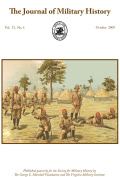
JOURNAL OF MILITARY HISTORY
Decoding the Complexities of Military HistoryJOURNAL OF MILITARY HISTORY, published by the Society for Military History, stands as a pivotal resource in the realm of military studies, engaging scholars and practitioners alike since its inception. This esteemed journal, with ISSN 0899-3718 and E-ISSN 1543-7795, explores the multifaceted dimensions of military history, offering rigorous analyses, original research, and significant historical insights that contribute to a deeper understanding of warfare's impact on societies throughout history. The journal is housed at the George C. Marshall Library of the Virginia Military Institute, providing a unique institutional backdrop that enhances its scholarly pursuits. Although it does not offer open access, the journal's commitment to publishing high-quality, peer-reviewed articles ensures that it remains a vital addition to academic libraries and researchers dedicated to military history. With its comprehensive scope and focus on convergence periods in military scholarship, the JOURNAL OF MILITARY HISTORY continues to shape discussions and influence studies in this essential field.

Archeologicke Rozhledy
Empowering researchers to uncover the stories of our past.Archeologicke Rozhledy, published by the Academy of Sciences of the Czech Republic, Institute of Archaeology, is a pivotal open-access journal dedicated to advancing the field of archaeology. Since transitioning to open access in 2019, it has made significant strides in disseminating high-quality research, serving as a vital resource for researchers, professionals, and students alike. With an ISSN of 0323-1267, the journal has gained recognition for its contributions in the domains of arts and humanities, particularly archaeology, as evidenced by its 2023 Q2 ranking in both categories. Operating out of the historical city of Prague, the journal encompasses a broad scope of archaeological scholarship, reflecting a commitment to interdisciplinary approaches and fostering dialogue within the global archaeological community. With its notable Scopus rankings—#115/413 in Arts and Humanities and #113/354 in Social Sciences—Archeologicke Rozhledy stands as a crucial outlet for innovative research and scholarly exchange.